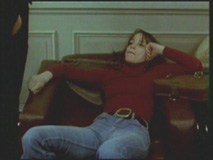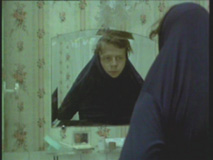|
Newest Reviews:
New Movies -
The Tunnel
V/H/S
The Tall Man
Mama Africa
Detention
Brake
Ted
Tomboy
Brownian Movement
Last Ride
[Rec]³: Genesis
Hara-Kiri: Death of a Samurai
Indie Game: The Movie
Abraham Lincoln: Vampire Hunter
Old Movies -
Touki Bouki: The Journey of the Hyena
Drums Along the Mohawk
The Chase
The Heiress
Show
People
The Strange Affair of Uncle Harry
Pitfall
Driftwood
Miracle Mile
The Great Flamarion
Dark Habits
Archives -
Recap: 2000,
2001, 2002,
2003, 2004
, 2005, 2006,
2007 , 2008
, 2009 ,
2010 , 2011 ,
2012
All reviews alphabetically
All reviews by star rating
All reviews by release year
Masterpieces
Screening Log
Links
FAQ
E-mail me
HOME
| |
Chloe in the Afternoon (Eric Rohmer, 1972)
 The majority of films, even when not based on any sort of
literary source material, proceed like a novel, spinning complex narratives
while juggling each character and plot thread that is encompassed within its
scope. Even when such films work, the effort expended is noticeable (and often
quite rewarding). There are also some films with a narrower, but deeper, focus,
that feel as if they have been adapted from short stories, since they present an
expression that feels as if they might have flowed with an almost effortless
succinctness if they existed on the page. I don’t mean to state a preference
between these two types of narrative films, nor simplify cinema by trying to set
up an easy dichotomy, but Eric Rohmer’s Chloe in the Afternoon (the
last of his “Six Moral Tales”) is definitely one of the latter types,
since it uses its minimal story setup to present questions about infidelity and
societal norms that almost flit by almost without fuss. Rohmer’s style is
typically unembellished here, with each briskly edited scene existing only long
enough to create an impression of the intent. Never for a moment does the mood
feel overplayed. Because of that relative austerity, the moments that are
highlighted with a zoom shot or an edit that clearly editorializes pack an
emotional wallop that hardly seems possible, given their apparent plainness.
The majority of films, even when not based on any sort of
literary source material, proceed like a novel, spinning complex narratives
while juggling each character and plot thread that is encompassed within its
scope. Even when such films work, the effort expended is noticeable (and often
quite rewarding). There are also some films with a narrower, but deeper, focus,
that feel as if they have been adapted from short stories, since they present an
expression that feels as if they might have flowed with an almost effortless
succinctness if they existed on the page. I don’t mean to state a preference
between these two types of narrative films, nor simplify cinema by trying to set
up an easy dichotomy, but Eric Rohmer’s Chloe in the Afternoon (the
last of his “Six Moral Tales”) is definitely one of the latter types,
since it uses its minimal story setup to present questions about infidelity and
societal norms that almost flit by almost without fuss. Rohmer’s style is
typically unembellished here, with each briskly edited scene existing only long
enough to create an impression of the intent. Never for a moment does the mood
feel overplayed. Because of that relative austerity, the moments that are
highlighted with a zoom shot or an edit that clearly editorializes pack an
emotional wallop that hardly seems possible, given their apparent plainness.
 Telling a relatively straightforward story about a bored
husband’s friendship and flirtation with the titular figure from his past,
Rohmer never threatens to expand the meaning of his tale beyond the meaning it
has for its protagonist, so when it doesn’t attempt to achieve definitiveness,
the audience hardly minds. The director’s tone is neither modest nor immodest,
instead opting to try to find some sort of interested objectivity when looking
at its characters, placing the job of judgment largely in the viewer’s hands.
After allowing the husband a chance to explain his point of view in a lengthy
prologue, the film begins presenting his actions without his internal
commentary, but because he had a chance to speak, the motivations behind his
actions are made clear. Though he never tells the audience or another character
about his ambivalent opinions of his would-be mistress, they’re easy to
surmise given the information presented, and in that approach, which appeals to
the observer’s ability to reason, the film builds its moral quandary. There
exists in Chloe’s characters a rare sort of self-reflection, and it’s
immensely gratifying to watch in action. Both in watching Chloe position herself as a
femme fatale to make herself so unattainable that her prey can’t resist her
and the husband reconcile his actions around her, the film and the performances
reward the viewer’s perceptiveness. Instead of indulging in a typically
simplistic game of cat and mouse within a convoluted framework, Chloe in the
Afternoon uses its presents the viewer with a more complex set of
revelations that belies the simplicity of its plot structure.
Telling a relatively straightforward story about a bored
husband’s friendship and flirtation with the titular figure from his past,
Rohmer never threatens to expand the meaning of his tale beyond the meaning it
has for its protagonist, so when it doesn’t attempt to achieve definitiveness,
the audience hardly minds. The director’s tone is neither modest nor immodest,
instead opting to try to find some sort of interested objectivity when looking
at its characters, placing the job of judgment largely in the viewer’s hands.
After allowing the husband a chance to explain his point of view in a lengthy
prologue, the film begins presenting his actions without his internal
commentary, but because he had a chance to speak, the motivations behind his
actions are made clear. Though he never tells the audience or another character
about his ambivalent opinions of his would-be mistress, they’re easy to
surmise given the information presented, and in that approach, which appeals to
the observer’s ability to reason, the film builds its moral quandary. There
exists in Chloe’s characters a rare sort of self-reflection, and it’s
immensely gratifying to watch in action. Both in watching Chloe position herself as a
femme fatale to make herself so unattainable that her prey can’t resist her
and the husband reconcile his actions around her, the film and the performances
reward the viewer’s perceptiveness. Instead of indulging in a typically
simplistic game of cat and mouse within a convoluted framework, Chloe in the
Afternoon uses its presents the viewer with a more complex set of
revelations that belies the simplicity of its plot structure.
* * * *
01-16-03
Jeremy Heilman
|